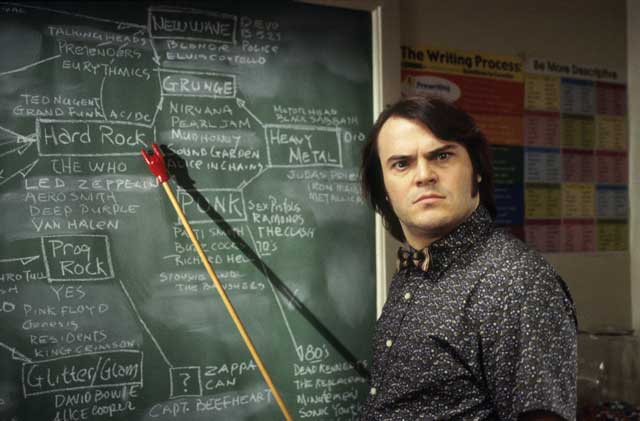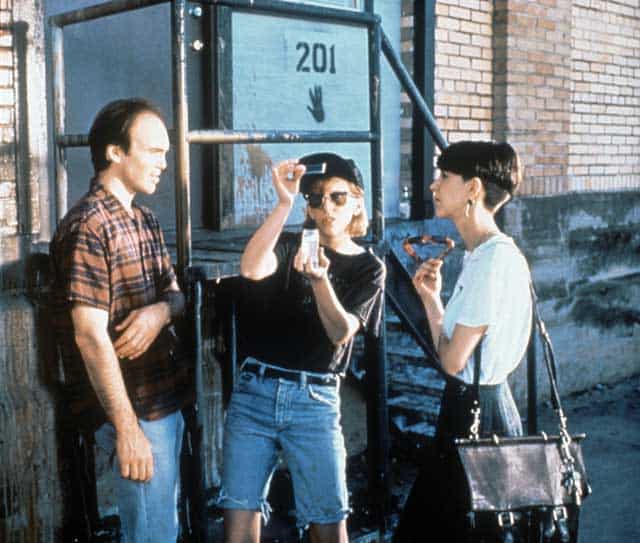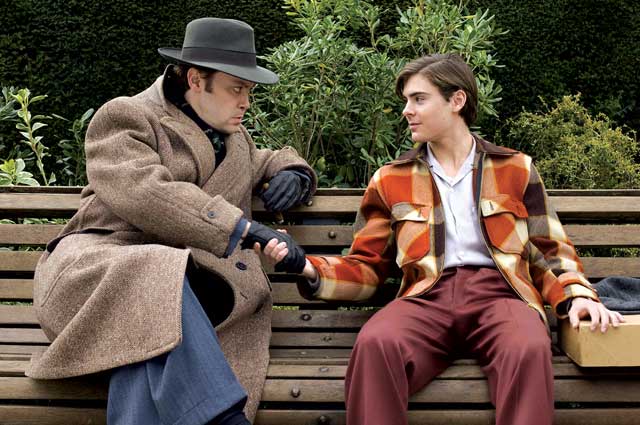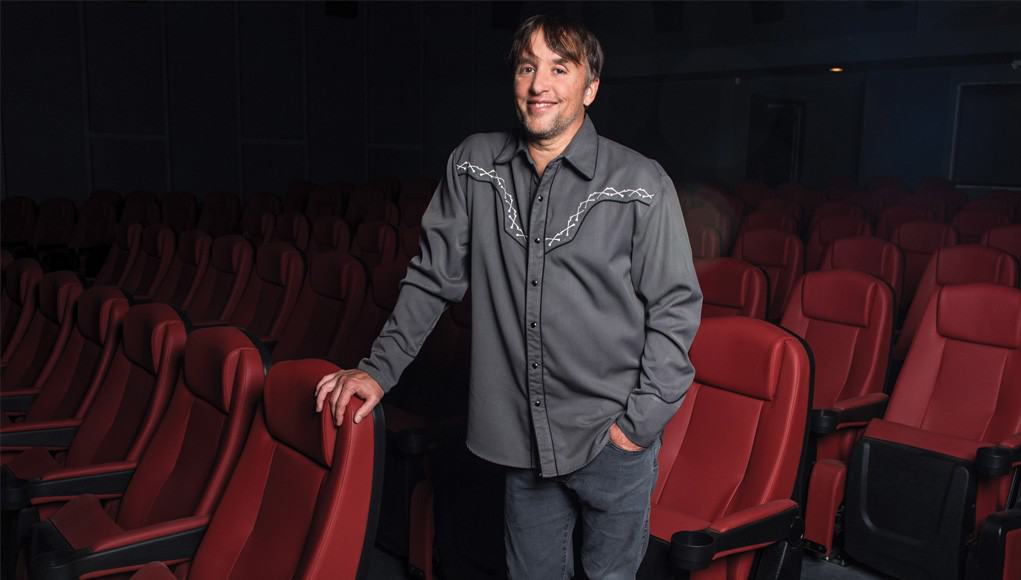by Rebecca M. Alvin
Top Image: Photo: David Brendan Hall/Courtesy of Austin Film Society
In 1979, Jonathan Kaplan’s film Over the Edge came out. Set in the fictional New Granada, Colorado, it told the story of disaffected youth growing up in cookie-cutter homes in suburbia, escaping from their boredom and their parents’ cluelessness through sex, drugs, and rock n’ roll, ultimately leading to the violent destruction of the town. Hollywood has a long history of troubled-youth films, but this one struck a chord with many. It also introduced us to Matt Dillon, 14 years old at the time, as Richie, one of the punks causing all the trouble with his bad attitude and good looks. The kids in this film were real kids, young teenagers, not older actors portraying youth, and the teenage angst and suburban ennui spoke to a generation of young filmgoers, including this year’s Provincetown International Film Festival Filmmaker on the Edge awardee Richard Linklater.

The 60-year-old filmmaker recalls the film fondly and only recently realized how important it was to his own work, which also has struck a chord with Generation X. His independent films Slacker (1990), Dazed and Confused (1993), the Before trilogy (1995 – 2013) with Ethan Hawke and Julie Delpy, a remake of another 1970s favorite, The Bad News Bears (2005), and the epic examination of parenting, shot over 12 years with the actors aging right along with the characters, Boyhood (2014). He also made more mainstream Hollywood films like School of Rock (2003), but even there, the Gen X sensibilities are palpable.
Thinking about Over the Edge now, Linklater recalls, “I saw it on a double-bill with Los Olvidados by [Luis] Buñuel—can you imagine a better double-bill? And I’ve always said that film, along with Lindsay Anderson’s If has THE true, pure teenage ending. You know, just strike back at the oppressors! There’s a catharsis in it,” he says with a laugh. Recently, he says he showed that film to his 16-year-old twins, who loved it. Watching it with them he says he realized, “Oh yeah, Dazed and Confused is the first half of that movie, you know teenagers getting high and goofing around, before anything really happens.”

So many of Linklater’s films reflect this ethos, the idea that a movie about people going through life without any extraordinary events happening to them is thoroughly engaging to watch because the characters feel authentic. It’s about them, about their thoughts, not about external events.
Linklater didn’t go to film school. He studied philosophy and literature at Sam Houston State University and played around with Super 8 film, teaching himself about filmmaking. He says it was “not a conscious decision, just a slow realizing that that’s how you were thinking and that, I don’t know, just a kind of an obsession that was manifested.” He laughs and adds, “I still don’t even think I’m having a career, you know, I always think it could end tomorrow if I don’t ever get another film made… I don’t trust the industry to deliver on any promise of a better tomorrow. Like you know, if you do this, then this will be —I don’t see that. I’ve never done anything with the hope that it would lead to anything else or become something bigger, you know what I mean? Each film is its own end of the line. In my thinking, anyway.”

Slacker, which was his second feature (the first was a little seen film called It’s Impossible to Learn to Plow by Reading Books) came out in 1990 and its title would soon be used as an alternative moniker for Generation X. As entertaining and interesting as the characters in Slackerare, it’s the actual meandering structure of the film that seemed to reflect the generation so well. It begins with a character played by Linklater delivering a philosophical monologue to a cab driver that introduces the approach to the film, with its many threads and tangents. We then go from character to character, spending brief periods with them, before they are replaced by other characters, as though we are going down a winding path of Austin, Texas, youth.
He followed up Slacker with an even more resonant film, Dazed and Confused, which not only introduced us to Matthew McConaughey but took that winding, character-driven writing style back to high school in the 1970s. Both films capture their time periods not only through his unique approach to plot, with nothing much happening (sort of a Texas, Gen X My Dinner with André), but also the dialogue that is somehow both philosophical and naturalistic to the point that it feels improvised, even though Linklater is strongly opposed to improvising on the set. “I’m not saying [improvisation] doesn’t have a place in film, because I think some people might use it well, but I don’t. I’ve never really figured out how to do that,” he says. “I’m too much of a writer to think like that.”

At the same time, he says his writing process does allow a lot of room because more than just being a writer, he’s a re-writer. “That’s kind of what I am, is a re-writer, all the way through rehearsals. Even the morning of shooting, we’ll get together in someone’s trailer and they’ll do the scene one more time and [I’ll get] any last-minute ideas. And even in between takes, we might have a new idea, a funny line, or anything. To me, it’s an ongoing process. It’s never over. So I’m always looking to keep working on anything, so it’s never quite set, but it’s always going in one direction, hopefully.”
Linklater has been prolific and varied in the kinds of films he’s made. He’s directed much bigger films written by others, such as School of Rock (2003) with Jack Black and the Bad News Bears remake (2005) starring Billy Bob Thornton. He created surrealistic animated films like Waking Life (2001) and A Scanner Darkly (2006), both of which use rotoscoping, a type of animation that essentially animates live-action to create something in between graphics and reality. And of course, his small romantic trilogy: Before Sunrise (1995), Before Sunset (2004), Before Midnight (2013) brings some of the same attention to everyday details we saw in his early films about youth to an adult couple from their first meeting in their twenties through their eventual marriage and middle age. The films are made and set nine years apart from each other and they are quiet, intimate, dialogue-driven films, something that is oddly daring in a climate of action-packed movies that dominate cinema screens even more today than they did when these films were made.

But Linklater has always gone a different route, and that’s why he’s being honored at the Festival this year. While he has directed Hollywood films, he’s been a champion of independent, regional filmmaking since 1985 when he founded the Austin Film Society, a nonprofit organization that now boasts its own 20-acre studio, public access television stations, a grantmaking program, training programs, and movie theaters that bring remarkable films from around the world to Texas audiences. Linklater not only founded the organization but is currently its artistic director.
“I just believe in filmmakers everywhere,” he says. “You end up supporting the ones who are nearby, but in the abstract, we have a theater, and a film society, we give out grants you know we’re kind of in support of film everywhere worldwide, so it’s the old ‘think globally, act locally’ kind of thing,” he says.
Richard Linklater will be receiving the Filmmaker on the Edge Award at this year’s Provincetown International Film Festival, which runs in a hybrid live/virtual format now through June 25. Linklater will be interviewed by filmmaker John Waters in a virtual awards presentation. For tickets and information about the event visit provincetownfilm.org/festival.











